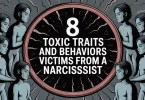A relationship between a narcissist and a super empath is one of the most devastating and heartbreaking combinations one can imagine. For the empath, of course, however, what most people don’t know is that eventually, every empath gets the strength to walk away. So, what happens when an empath leaves a narcissist? Let’s look at things from both of their perspectives.
The Narc’s Point of View:
Number One: Guilt Trips and the Blame Game
Let’s get one thing straight – someone with Narcissistic Personality Disorder (NPD) will never admit that they’re wrong. They’ll never face the truth and accept that they’re wrong, let alone say it out loud. NPD is all about not taking the blame for anything. However, what they will do is try to put the blame on the empath who left them. Suddenly, they are not responsible for anything that went wrong in their relationship, according to this blame game. Their empathic partner left them out of the blue, and they did nothing wrong. This is nothing but an attempt at manipulation, assuming that the empath will come back if they guilt-trip them successfully.
Number Two: Playing the Victim
An empath is always a narcissistic victim in the eyes of the narcissist. They’re the ones who were abused, heartbroken, and mistreated all along. Nevertheless, that is not how someone with a narcissistic personality sees the entire situation. They know the truth but deliberately try to manipulate it to suit them best. When an empath leaves, the narcissist reverses the roles, accusing their partner of the things they are actually guilty of. They turn the tables on them, eroding the empath’s reputation and attempting to brainwash everyone into believing their deceptions.
Number Three: Eroding an Empath’s Reputation
Every narcissistic person craves acceptance and cares deeply about their public image. They won’t allow their reputation to be destroyed under any circumstances. Instead, they’ll do everything in their power to erode their former partner’s reputation. They fabricate the truth, lie, and deceive everyone around them, even influencing mutual friends, the empath’s best friends, and family. The ultimate goal is to get everyone on their side, making it easier for the empath to go back to their abuser.
Number Four: Emotional Blackmail
The next step involves emotional blackmail. Narcissists are ready to say anything to get their way. They claim they will remain alone and miserable, trying to convince their ex that they are responsible for them and their previous relationship. Using their knowledge of the empath’s triggers and weak spots, they manipulate them. If the usual blackmail doesn’t work, they may even threaten to harm or kill themselves if the empath doesn’t come back.
Number Five: False Remorse
If nothing else works, the narcissist may express remorse, claiming they miss their ex, admitting mistakes, promising to act better in the future, and offering a detailed plan for change. However, this remorse is false; narcissists don’t change without proper medical help and treatment. It’s an act to manipulate the empath into coming back.
Number Six: Destroyed Ego
Insecurity is a dominant narcissistic trait, but narcissists hide it well. Their ego is dependent on constant reassurance from their surroundings, especially their partner. When the empath leaves, the narcissist’s ego breaks, and they struggle with extremely low self-esteem. The only effective way to hurt a narcissist emotionally is by withholding unconditional love.
Number Seven: Rebound Relationship
After an empath leaves, the narcissist may go back to their insecurities, questioning their worth. They start to feel the impact of the loss, but a narcissist’s ego won’t recover through self-love or self-awareness. Instead, they resort to a rebound relationship to make the empath jealous. The narcissist will do whatever it takes to regain their sense of self-worth, using the new relationship as a tool to manipulate the empath.
Number Eight: Threats
After failed negotiations, the narcissist resorts to threats. They threaten to destroy the empath’s life, expose their secrets, destroy their reputation, continue emotional abuse, and even physically harm them. This is particularly challenging for empaths co-parenting with a narcissist, as the narcissist uses every means to crush their victim’s well-being, threatening custody and turning children against the empath.
The Empath’s Point of View:
Number One: Self-Doubt
The empath, after leaving a narcissist, experiences self-doubt. Despite reaching the breaking point, they question their decision, wondering if they could have done more to change the narcissist or if their relationship deserved another chance.
Number Two: Fear of Judgment
The super empath, despite being aware of the narcissist’s lies, is still afraid of judgment. This highly sensitive person fears what others might think, especially from narcissistic family members. This fear is rooted in self-judgment, doubting their choice and worrying they made the wrong decision.
Number Three: Remorse
The empath’s remorse stage lasts longer than usual. They grieve the loss of the relationship, not for the abuser but for what could have been. They feel sorry for not being able to change the narcissist and for leaving them in the darkness.
Number Four: Rethinking Their Decision
At a breaking point, the empath rethinks their decision. Some may fall for the narcissist’s deceptions and give the relationship another try, while others firmly stick to their decision.
Number Five: The Final Choice
Finally, the empath makes a decision. Those who go back to the narcissist get trapped in an endless circle of emotional abuse. However, for those who move on, they face a long and exhausting healing process with good and bad days. The most crucial aspect is that a decision has been made, and there is no going back.







Leave a Comment